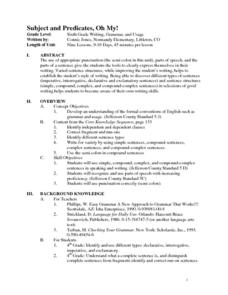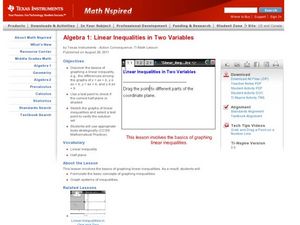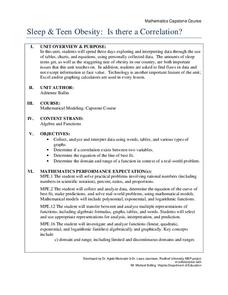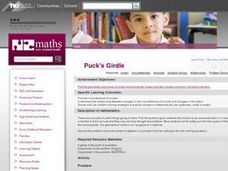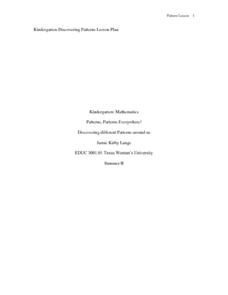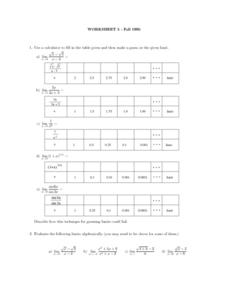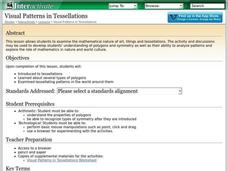Curated OER
Buying Cars/Financing Cars Compound Interest
Provide a real world context in which exponential functions are used to determine a eal world phenomena such as compound interest and exponential growth. This lesson should be taught after students have mastered the laws of exponents and...
Curated OER
Subject and Predicates, Oh My!
Eliminate all doubt when it comes to sentence structure with nine thorough lesson plans. Whether you want your young writers to vary their sentence structure or shore up their knowledge of conjunctions and semicolons, these lessons are a...
Curated OER
Exponent Rules
Pupils use calculators to work independently to discover the rules for working with exponents. The lesson requires the use of a TI-nspire handheld and software.
Curated OER
Famous Public Properties
What can a middle schooler do in 90 minutes? He can practice using the commutative, associative and distributive properties of addition and multiplication. He can also simplify expressions using the commutative, associative and...
Curated OER
Linear Inequalities in Two Variables
Graph and solve linear equations in two variables. The class relates the concepts of linear equations to the real world.
Howard County Schools
Building a Playground
Scholars crave practical application. Let them use the different models of a quadratic function to plan the size and shape of a school playground. They convert between the different forms and maximize area.
Curated OER
Does Order Really Matter?
Investigate the order of operations! Learners participate in interactive multi-media activities to examine and solve multi-step equations, inequalities. They evaluate formulas and simplify monomials and polynomials.
Mathematics Vision Project
Geometric Figures
Logical thinking is at the forefront of this jam-packed lesson, with young mathematicians not only investigating geometric concepts but also how they "know what they know". Through each activity and worksheet, learners wrestle with...
K12 Reader
Points on a Coordinate Grid
Introduce your class to the basics of coordinate planes. The reading passage included here describes ordered pairs and the different quadrants on a coordinate grid. Learners read the passage and respond to five related questions.
Radford University
Sleep and Teen Obesity: Is there a Correlation?
Does the number of calories you eat affect the total time you sleep? Young mathematicians tackle this question by collecting their own data and making comparisons between others in the class through building scatter plots and regression...
Curated OER
Puck's Girdle
Fifth graders calculate the perimeters, areas, and volumes of everyday objects. They discuss the word problem involving Puck from the Shakespeare play "Mid-Summer Night's Dream," and invent and plan a method for solving the problem in...
Curated OER
Radical Equations
This task gives geometry learners practice in solving radical equations in one variable and zeros in extraneous solutions.
Illustrative Mathematics
Bookstore Account
We use debt often to describe negative numbers and your learners will be able to see how it translates into math. They will be asked to go through a series of transactions and make simple equations for each one, following it with a...
Texas Woman’s University
Patterns, Patterns Everywhere!
Not only is pattern recognition an essential skill for young children to develop, it's also a lot of fun to teach! Over the course of this lesson, class members participate in shared readings, perform small group...
EngageNY
Finding Systems of Inequalities That Describe Triangular and Rectangular Regions
How do you build a polygon from an inequality? An engaging lesson challenges pupils to do just that. Building from the previous lesson in this series, learners write systems of inequalities to model rectangles, triangles, and even...
Radford University
Parallel Lines, Transversals, and Angles: What’s the Connection?
Streets, bridges, and intersections, oh my! Parallel lines and transversals are a present in the world around us. Learners begin by discovering the relationship of the angles formed by parallel lines and a transversal. They then...
Curated OER
Worksheet 5: Property Limits and the Squeeze Theorem
In this math worksheet, students answer 6 questions regarding given limits in a table of data, properties of limits and the Squeeze Theorem.
Centre for Education in Mathematics and Computing
Number Sense and Numeration: Exponents
On a three-page assignment, number crunchers will examine the laws of exponents and apply them to a variety of problems. They write expressions in exponential form or as repeated multiplication. They evaluate and simplify exponential...
Curated OER
Ratios, Rates, Percent and Nutrition
Examine food labels to determine percentage of fat and sugar to total calories with middle schoolers. Daily nutritional guidelines are discussed and learners will decide how well their foods fit into a healthy diet. In the provided...
Shodor Education Foundation
Visual Patterns in Tessellations
Geometers explore the concept of tessellations. They use a tessellation applet to manipulate shapes and design their own tessellation using the applet.
Curated OER
The Intermediate Value Theorem
You and your calculus learners will appreciate this description, discussion, and examples of the Intermediate Value Theorem. Applications of the theorem are also discussed.
Project Maths
Complex Number Operations
What do animated videos have to do with mathematics? Using operations of complex numbers and their representations on the complex plane, high schoolers observe how mathematics could be used to move animations. The lesson...
Fredonia State University of New York
Watch Your Step…You May Collide!
Can two lines intersect at more than one point? Using yarn, create two lines on the floor of the classroom to find out. Cooperative groups work through the process of solving systems of equations using task cards and three different...
Radford University
A Change in the Weather
Explore the power of mathematics through this two-week statistics unit. Pupils learn about several climate-related issues and complete surveys that communicate their perceptions. They graph both univariate and bivariate data and use...
Other popular searches
- Algebra Ii and Trigonometry
- Algebra Ii Grade 8
- Algebra Ii Games
- Algebra Ii Solving Equations
- Algebra Ii Review
- Algebra Ii Powerpoint
- Algebra Ii Projects
- Algebra Ii Quadratic
- Algebra Ii Polynomials
- Algebra Ii Data Project
- Matrix Algebra Ii
- Algebra Ii Jeopardy



